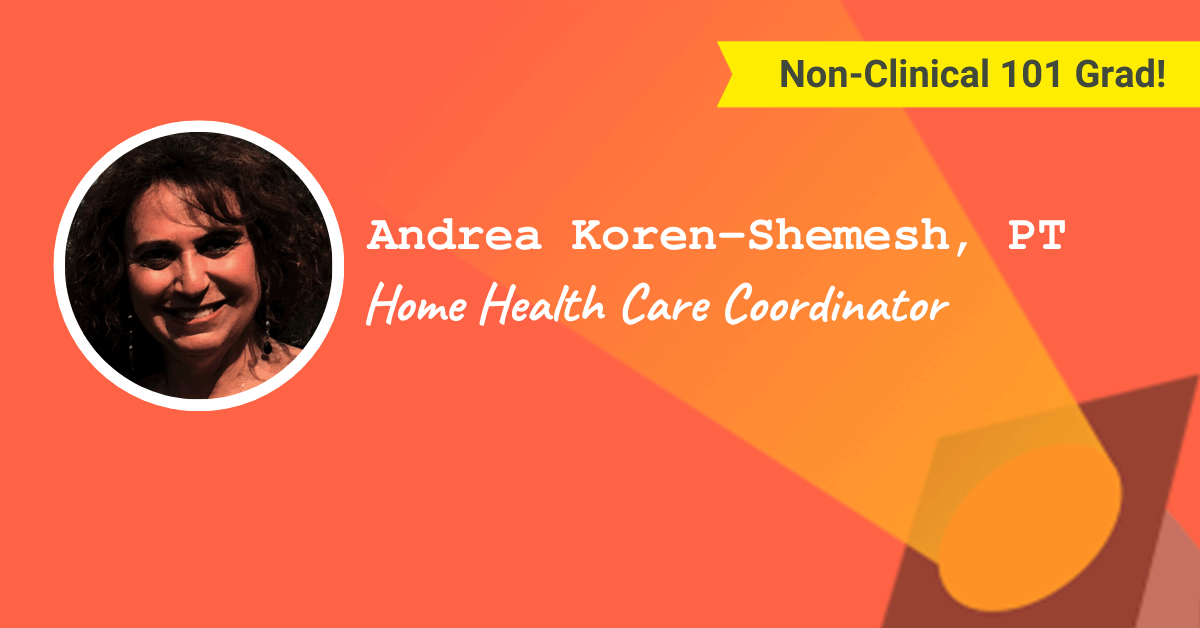This week’s spotlight is on Andrea Koren-Shemesh, PT, a Non-Clinical 101 graduate who is now Home Health Care Coordinator at naviHealth!
This post may contain affiliate links or codes. This won’t increase your cost, but it helps keep TNCPT alive, and free of annoying ads! Thank you for your support. 🙂
What is your full name, title, and company name for your current, primary role?
Andrea Koren-Shemesh, PT — Home Health Care Coordinator for naviHealth

Where are you located?
Charlottesville, VA.
Where did you go to PT school, and what year did you graduate?
I graduated from Tel Aviv University in 1989.
What did you do when you first finished school, and for how long?
I worked as a PT in a large neurological rehab hospital in Israel.
In what setting(s) did you work, and what types of patients did you treat?
I worked in the following settings:
- Neurologic inpatient rehab
- Outpatient
- Home health
I also specialized in women’s health and pelvic floor rehab.
Please refrain from contacting our spotlight participants on social media. There are thousands of readers just like you out there. 🙂 Please ask your questions in the comments on this blog post.
If you’re a Non-Clinical 101 student, you can network with many of our spotlight participants in the alumni groups!
What did you enjoy about your early roles? What didn’t you enjoy?
I loved the personal interaction with my patients.
I didn’t enjoy the copious amounts of documentation and the stressful work environment.
What else have you done since then, prior to your current role?
Prior to my current role, my career was exclusively in physical therapy. I worked in most clinical settings, except acute care.
When and why did you decide to do something non-clinical?
The thought started gnawing at me a few years ago. I felt increasingly burned out from the patient load, direct patient contact, and documentation that I needed to complete without any specific time slot to complete it—except on my own personal time.
At first, I didn’t do much about it, except research my options for a couple years. Then, I started taking steps toward this goal by modifying my resume for non-clinical positions, in particular for remote non-clinical positions.
What are you doing these days?
I work in utilization management as a home health care coordinator at naviHealth.
Are you still treating patients, or are you solely non-clinical?
I am solely non-clinical, and I love it!
How long have you been in your care coordinator role?
19 months.
What do you wish you would’ve known before going into this role?
I wish I had better computer skills. I also wish I would’ve known that I would be so heavily judged on productivity.
Did you get any special certifications or training along the way to help you get into your current role?
I completed the Non-Clinical 101 course. It was tremendously helpful in deciding which jobs to apply to, modifying my resume to fit the job title, and preparing for the interviews.
How did you find your care coordinator job? Did you apply or find it through a connection?
I searched a few sites, such as LinkedIn and Indeed.
Did you do anything special to your resume and cover letter to land the job?
Absolutely. As I mentioned before, The Non-Clinical PT’s course Non-Clinical 101 was extremely helpful in modifying my resume. I also had a career advisor, who helped me with the resume modification.
What was the interview like for the care coordinator role?
The interview was not very stressful. In fact, I had a series of three interviews with the company prior to receiving the offer.
How have people reacted to you leaving patient care?
They completely understood my motives and the fact that, after almost 30 years in the profession and in the clinical field, I was more than ready for a change!
What’s a typical day or week in the life like for you? What types of tasks and responsibilities fill your time?
I work 8 am to 5 pm, Monday through Friday. I do have occasional opportunities for overtime—either after hours, on weekends, or on holidays—but those are strictly on a volunteer basis.
I work on the computer throughout the eight-hour day. The work is intensive since I am evaluated on my productivity. Occasionally, I need to contact home health agencies and discuss the case with them in order to reach a resolution.
What are some of the rewards of your role? What are the biggest challenges?
I get to work from home with my pets surrounding me, which is a huge benefit for me.
My computer skills are pretty basic, and that is a challenge for me. I was able to learn everything I need to perform my job rather quickly. However, I feel I still have frequent challenges regarding my computer skills that I need to tackle and ask for assistance from my manager or teammates.
Working alone at home is also a challenge, but I work with an amazing team. We communicate well and often via Microsoft Teams.
How did your clinical background prepare you for this role? Which skills transferred?
Most of my clinical PT skills transferred to my home health care coordinator role. Those skills include:
- The ability to provide education, which I use now to educate home health agencies
- Strong attention to detail
- My clinical knowledge, which I use for the utilization management of my cases
- Computer skills
Roughly speaking, how are the hours and pay compared to patient care?
I did take a pay cut compared to my last clinical role, but I expected it.
My hours are very predictable. As soon as I complete my eight daily hours, I turn off the computer, and I’m done for the day. Unlike my clinical roles, where I always documented on my own personal time, after hours and on weekends. Huge change for the better!
What type of person do you think would do well in your care coordinator role?
The type of person who would do well in my role is:
- Very detail-oriented
- Patient
- Able to educate
- Someone who works well alone, without direct human or patient interaction, except via Microsoft Teams
- Willing to take initiative
- An independent problem-solver
- A team player
- Able to roll with and accept changes almost on a daily basis
Do you work remotely or onsite?
I work 100% remotely.
Does your organization hire PT, OT, or SLP professionals into non-clinical roles?
Yes, all of the above.
What is a typical career path for someone in your care coordinator role?
Someone in my role can definitely advance into managerial positions and leadership, such as Clinical Team Manager, and from there to the director level.
What is next for you? What are your high-level career aspirations?
At this point, I don’t have aspirations to advance through the leadership ladder. I am happy with what I am doing for the time being and for the foreseeable future.
What would you recommend to someone who is considering going into a role like yours? Do you have any special words of wisdom for the readers?
Stay open minded, keep applying to non-clinical positions, and don’t give up if that is what you want!
What would you like to change most in your profession, and why? How would you propose doing so?
If my role hadn’t been judged so heavily on productivity, it would have been perfect.
What career advice would you give yourself that you wish you had during school?
I wish I had sought this position years ago and not suffered through the years of clinical burnout as I did. I wish I had started this transition at least a decade sooner!
What would you teach to today’s graduate students in your profession, if you had the opportunity?
If you feel unsatisfied in your clinical position, know that you have an alternative in the non-clinical field. Don’t wait to take this step if you feel it is the right step for you.
Do you have any special advice for others who want to follow in your footsteps?
Follow your dream, and don’t give up until you reach it!





